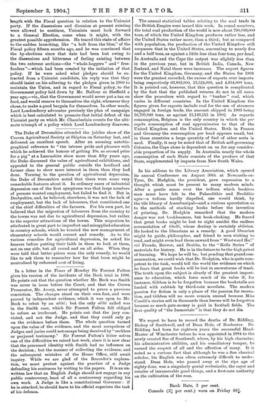In a letter in the Times of Monday Sir Forrest
Fulton gives his version of the incidents of the Beck trial in 1896. He points out that the question whether Mr. Beck was Smith was never in issue before the Court, and that the Crown Prosecutor, Mr. Avery, never attempted to prove a previous conviction. The charges stood on their own feet, and were proved by independent evidence, which it was open to Mr. Beck to rebut by an alibi; but the only alibi called was in the Smith case, which Sir Forrest Fulton felt obliged to refuse as irrelevant. He points out that the jury con- victed, and not the Judge, and that they could only go on the evidence before them. The whole question turned upon the value of the evidence, and the most scrupulous of Judges and juries could not escape being deceived by "reckless or perjured testimony." Sir Forrest Fulton's letter solves one of the difficulties we raised last week, since it is now clear that the presumed identity with Smith had no influence on the decision ; but the manner of collecting the evidence, and the subsequent mistakes of the Home Office, still await inquiry. While we are glad of the Recorder's explana- tion, we must protest against the practice of a Judge defending his sentences by writing to the papers. It is an un- written law that an English Judge should not engage in any public controversy, least of all a controversy regarding his own work. A Judge is like a constitutional Governor : if he is attacked, he should leave to his official superiors the task of his defence.






































 Previous page
Previous page